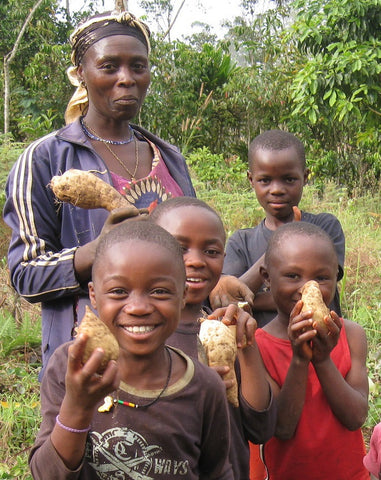Madera Outdoor
Plant a Tree and help feed a Family
Plant a Tree and help feed a Family
Couldn't load pickup availability

$5.00 is Enough to help plant five trees in sub-Saharan Africa in Cameroon, Kenya, Senegal, Uganda and Tanzania and does more good than you may think.
What will the money go to?
• Farmers learn to plan for their family’s future by discovering how planting 4,000 trees with food crops will help them make more money, grow more food and build a sustainable future.
• Farmers learn to plant rows of nitrogen fixing trees in and along borders of their degraded land to protect the field from pests and stop erosion.
• Farmers learn to plant over 12 types of fruit trees and vegetables to meet market opportunities and the nutritional needs of their families.


Forest Gardens give families: Significant increases in income, more paydays, more nutritious food to eat, security from risks related to markets, pests, and weather extremes, free alternatives to pesticides and fertilizers, feed for livestock, and fuel wood to cook.
This money will not be used as a handout. We believe that dignity and opportunity doesn't grow from a handout, it flourishes from jobs. Work to earn your legacy. Although charity has always been at the roots of our cause, we strongly believe that the dignity gained from willing and capable individuals working full time jobs is much stronger than much of the temporary assistance programs out there today.
Planting trees offers many other benefits, which can be referred to as ‘’co-benefits”. These include reducing erosion, creating natural wind barriers, providing habitats, and improving the local climate, air filtration, and shade provision. A portion will go to website maintenance and further development of products to further the progress of the Madera TFTF relief project.
Creating a Legacy
Working within schools, we can directly educate children in agroforestry practices that they may use on their farms one day.



As the sons and daughters of subsistence farmers get older, they – like everyone – slowly transition from being completely dependent on their parents to growing into independence. The lack of jobs and opportunities in rural, degraded farming communities pushes young adults to gravitate toward city centers – lured by the promise of big cities, higher-paying jobs and potential opportunities to sneak abroad.
When they arrive in the cities the reality of surviving with few skills applicable to their new life, competing with thousands of others for the same jobs, can be far more challenging than they bargained for. Oftentimes their only choice is to live in slums, living hand-to-mouth. They attempt to find low paying jobs carrying sacks of cement, working as a maidservant, guarding houses, digging ditches or picking up odd and often dangerous daily labor jobs. Some of these youth find their best option is to resort to dangerous or illegal activities, including prostitution or crime.
Many risk their lives sneaking onto shipping vessels or crawl across borders in search of a new life. Forest gardens give young people a way to make significantly more money in their home community than they can earn doing just about anything else. Our partner's four-year training program equips and empowers youth with new skills to diversify and sustain their agricultural production, to meet their food and fuel needs and begin accessing new markets with economically valuable tree species.
Forest Gardens Empower Women
For over 25 years, Trees for the Future has worked with women farmers to promote agroforestry interventions that help them revitalize their degraded lands, increase their incomes, and provide healthy food for their families. Recent estimates by researchers measure the female labor share in agriculture at 56% in Tanzania and 52% in Uganda.

In addition, our women partner farmers often spread the word about how sustainable and profitable the forest garden System can be, allowing many others in their communities to enjoy the advantages of agroforestry.
Your donation benefits millions.
Thank you,
The Madera Crew























